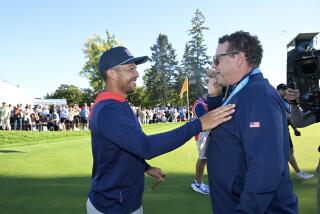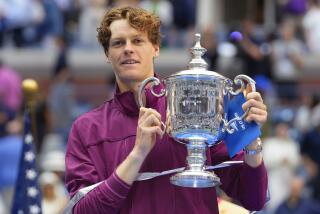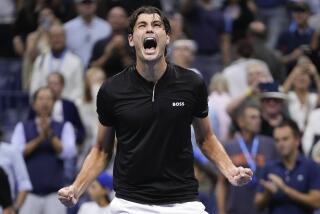U.S. OPEN : This One Is Pure Connors : Tennis: On his 39th birthday, he rallies from a 5-2 deficit in the fifth set to close out victory in a tiebreaker.
- Share via
NEW YORK — Unofficially, it was old-timers’ day at the U.S. Open, where Jimmy Connors had a busy Monday afternoon.
First, he turned 39, then he played five sets, stayed on the court 4 hours 42 minutes, beat somebody 15 years younger and arrived in the quarterfinals with a finger-pointing, fist-pumping, swearing, laughing, riotous act that left just about everybody breathless.
Except, of course, Connors, who had a few words left.
“For me to pull out another stunt like this, how can you not laugh about it. . . . What the hell is going on here?” Connors said.
As he walked out on Stadium Court, a sellout crowd of 20,000 serenaded Connors by singing “Happy Birthday.”
They could just as easily have switched to “This Old Man,” which seemed appropriate after a classic Connors conquest, a 3-6, 7-6 (10-8), 1-6, 6-3, 7-6 (7-4) decision over Aaron Krickstein.
Connors came from a break down in the fifth set, got it back even as Krickstein served for the match at 5-3, climbed into the deciding tiebreaker with a windmill overhead on which his feet cleared the court by a good two inches and knocked a backhand volley into the open court to end it on the first match point.
Along the way, Connors carried on in what has become his time-honored tradition, alternating somewhere between reform school and charm school.
He had a running problem with chair umpire David Littlefield, the most serious occurring at 7-7 in the first tiebreaker when Littlefield overruled a point and gave it to Krickstein.
Connors suggested, with decreasing subtlety, that Littlefield remove himself from the chair.
“Get your . . . out of the chair, you bum,” Connors yelled at Littlefield. “I’m playing my butt off at 39 years old and you’re doing that.”
Later, Connors termed Littlefield an “abortion,” asked if he was watching the same match that was being played, then stuck his face into a television camera and delivered this line: “I feel better than I look--don’t worry, it’s OK.”
Krickstein seemed intent on trying to change that, against overwhelming odds. Playing the part of the Washington Generals, Krickstein continually challenged Connors’ forehand, stuck to his passing shots and tried not to think that almost nobody wanted him to win.
“I mean, it’s kind of funny, all these people are cheering for him,” Krickstein said. “He has won five times here and I have never won anything.”
Connors played courageously, but not faultlessly. He made 106 unforced errors and converted only five of 24 break-point chances.
Krickstein hung in the backcourt, making only 16 approaches to the net the entire match while Connors tried to end the points quickly and made 137 advances.
They even had contrasting injuries--Connors a sore knee and Krickstein a blister on his serving hand. As for style of play, there were different strategies, but it was also hard to disagree with what he chose, Krickstein said.
“Yeah, maybe I could play a little more aggressive at certain times, but there was only one or two points difference,” Krickstein said.
The fifth set began 3 hours 12 minutes into the match and served as the cornerstone of what often looked like an extended warm-up with two guys knocking the ball back to each other.
The first three games of the second set lasted 30 minutes, one of them 16 minutes.
The seventh game of the fifth set lasted 17 minutes 30 seconds. Krickstein eventually held serve in the 23-point game after eight deuces, seven game points and three break points.
Connors, who put the match back on serve with a touch backhand volley on his fourth break point for 4-5, forced a deciding tiebreaker with another low-jumping overhead for 6-6.
This was his cue for another dialogue into the television camera courtside.
“This is what they pay for,” he said. “This is what they want.”
It was 6:43 p.m. EDT. The match was 4 hours 31 minutes long.
Soon, it was over. Connors jumped to leads of 3-1 and 5-2 before Krickstein closed to 5-4. Connors sent a stinging first serve to Krickstein’s backhand for a service winner and match point, from where his volley ended it a minute later.
“I can’t even explain this, this is something else, phew,” he said. “This was some kind of tennis.
“It’s my job. To be able to go out and do this, I can’t describe it, all I can do is make you feel you’re in that position. I can’t explain it to you and I’m there.
“To be in there in the second week at 39 years old, how can that not be satisfying?”
Relegated to what amounted to the preliminary match, defending champion Pete Sampras crushed 19 aces past David Wheaton and moved virtually unnoticed into the quarterfinals.
Sampras, who has 52 aces in four matches, started slowly but finished fast in a 3-6, 6-2, 6-2, 6-4, discourse on power tennis requiring 2 hours 32 minutes.
Sampras next will play No. 4 Jim Courier, who beat Emilio Sanchez, 6-4, 6-4, 6-3.
Afterward, Sampras found his position pleasing: “I won the match, so it was good.”
Apparently, all Sampras needed for inspiration was an early service break in the second set.
“When I got that (break) off him, he kind of lost some good concentration, lost a little bit of desire out there,” Sampras said.
Wheaton lost none of his combativeness, even in defeat. Just looking at Sampras’ serve isn’t that daunting, he said.
“It is not any different than anyone else,” Wheaton said. “I mean anyone else has a big serve, but he . . . doesn’t serve and volley too proficiently.
“He’s got a hard service, but it’s not tricky or anything,” he said. “It comes in real hard.”
Paul Haarhuis, who didn’t find it hard to upset Boris Becker in the third round, enjoyed a similarly easy straight-set victory over Carl-Uwe Steeb, 6-2, 6-3, 6-4, and gets Connors next.
And what exactly is Haarhuis getting? Connors is making no promises, but. . . .
“I’m still standing,” he said.
U.S. Open Notes
Steffi Graf is a fan of Jimmy Connors. Scheduled to play her fourth-round match with Judith Weisner on Stadium Court after Connors, Graf waited in the tunnel for it to end. “They said we could play on the Grandstand Court, but I am not going to leave the match,” Graf said. “I wanted to see the end of it.” Graf eventually scored a 7-5, 6-4, victory. . . . A game from the past nearly haunted Martina Navratilova again, but Manuela Maleeva-Fragniere didn’t give the four-time champion enough of a scare. Navratilova avenged last year’s shocking loss to Maleeva-Fragniere with a roller-coaster fourth-round victory, 7-6 (7-5), 1-6, 6-2. Navratilova could have dropped in straight sets since she trailed, 5-2, in the first set. “I got through that one, so now I am one round further than last year,” Navratilova said. “A friend of mine made a toast and said ‘Here is to doing better than last year,’ and I said that wasn’t much of a toast. Now I’m waiting for the next match. Anything can happen.”
Arantxa Sanchez Vicario struggled on her way to a 6-3, 7-6 (7-4) victory over Natalia Zvereva and meets Navratilova in the quarterfinals. . . . Conchita Martinez, who ousted Zina Garrison, 6-4, 6-4, will play Graf in the quarterfinals.
More to Read
Go beyond the scoreboard
Get the latest on L.A.'s teams in the daily Sports Report newsletter.
You may occasionally receive promotional content from the Los Angeles Times.










